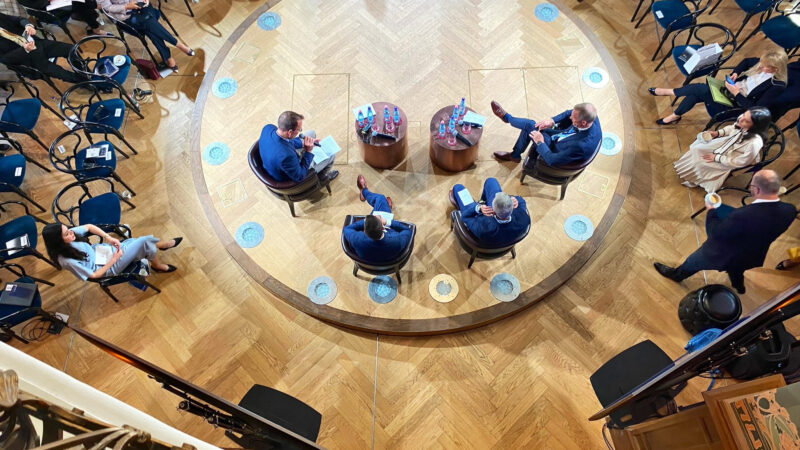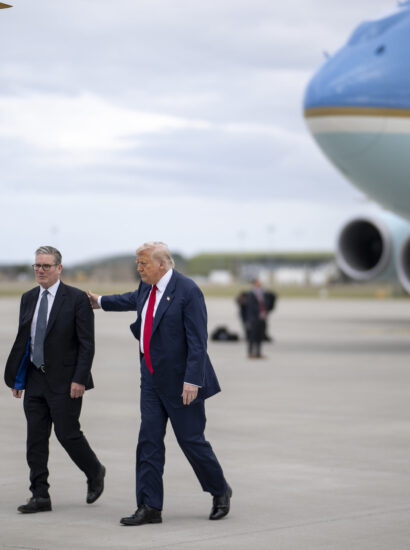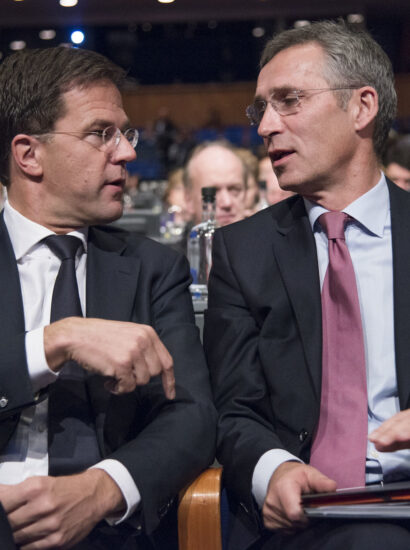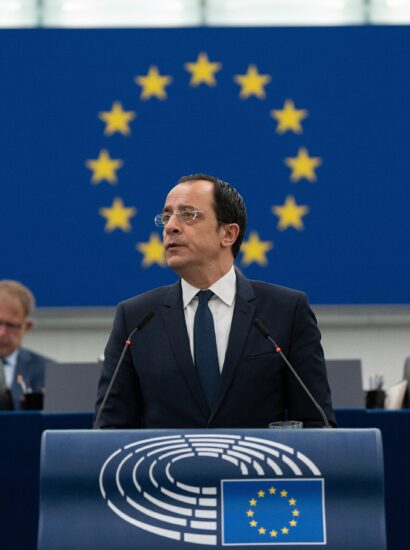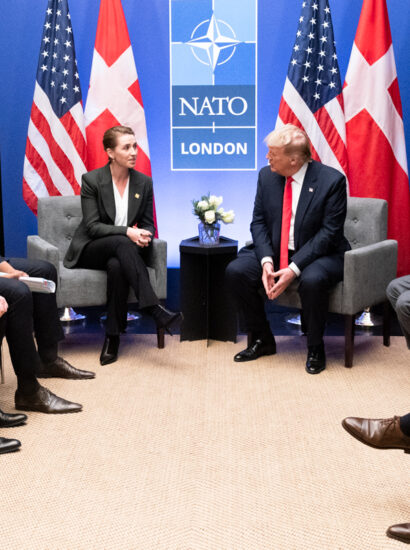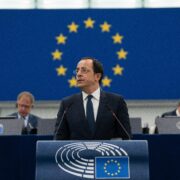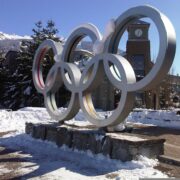“However, in the 75 years since the Alliance was founded, the international system has changed dramatically and new threats have emerged,” said Gladden Pappin, the President of the Hungarian Institute of International Affairs (HIIA) at the conference titled “NATO 75 – Hungary and the Future of NATO.”
Organized by the HIIA, the event took place in the magnificent Matild Palace overlooking the record-high Danube. In his opening remarks at the conference, Pappin recalled that NATO was founded to ensure peace and stability and to respond to the threat posed by the Soviet Union.
The security environment is constantly changing, and we must protect our interests and our security,” he said.
“We must find pragmatic and effective solutions to these changes, and NATO must prepare for the future, strengthening its capabilities and strategic autonomy while building peace and connectivity where possible.”
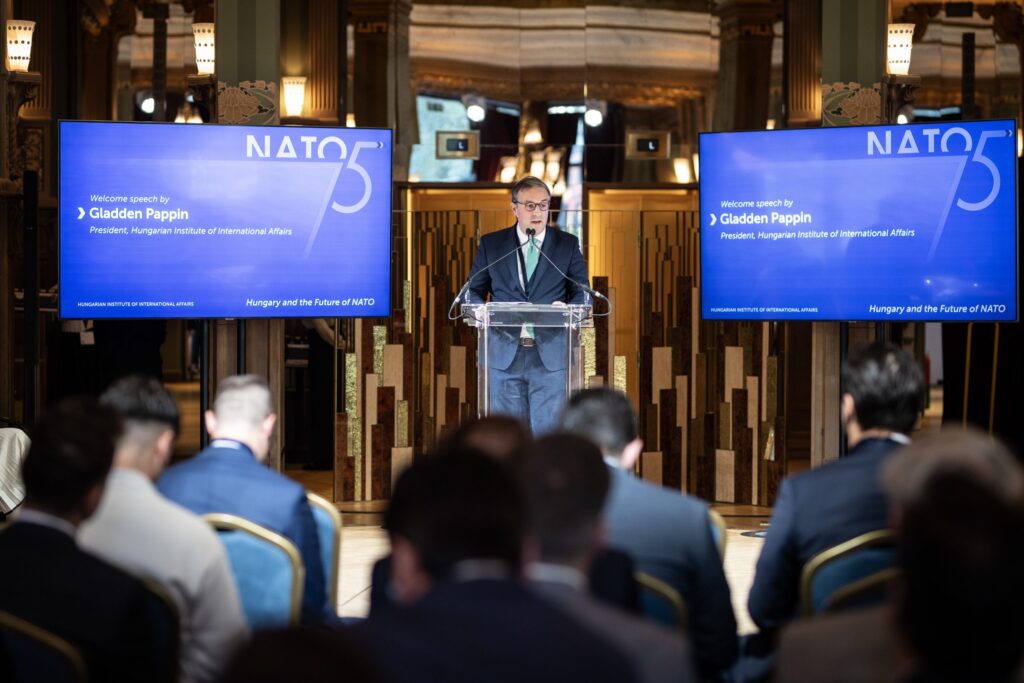
Gladden Pappin opens the NATO75: Hungary and the future of NATO Conference (Photo: Hungarian Institute of International Affairs)
The other keynote speaker, Benedetta Berti, Head of Policy Planning in NATO’s Office of the Secretary-General, said in her online presentation that NATO’s primary purpose is to provide a common defense. However, NATO is also an alliance based not only on interests but also on values. She emphasized that the Alliance must adapt to a changing environment. “We live in an increasingly interconnected world, where instability can occur in our neighborhood. As we face a more complex war, we must maintain security while simultaneously addressing non-military threats, from disinformation to cyberattacks. NATO is working on building strong resilience. It is essential to increase defense spending, which already reaches two percent of the GDP in most member countries,” she stated. Berti also pointed to the need to strengthen the defense industry in a more dangerous environment.
The HIIA’s conference is themed around the following issues: Should a collective defense organization be involved outside the Euro-Atlantic area? Attached to this, we can notice the global issues without causing more escalations. How can NATO prevent expansion from stoking global tensions, and how should countries relate to members before joining? What activities should be coordinated at the NATO level, and which not? How do members participate best in NATO in light of the answers to these questions. Finally, the role of the US in the alliance – given its shifting priorities and political changes.
NATO vs America
The roundtable discussion on “How is America’s Role in NATO Evolving?” was opened by George Beebe, Director of the Quincy Institute’s Grand Strategy programme, “There is too much instability in Europe and the world. The conflict in Ukraine has had significant consequences for the relationship between the United States and Europe. Either we find a solution that guarantees Ukraine’s security, or it will remain an open wound in Europe for a long time,” stated Beebe.

George Beebe, Drew Peterson, Carlos Roa, Péter Rada at the NATO75: Hungary and the future of NATO Conference (Photo: Hungarian Institute of International Affairs)
“The U.S. needs to recognize that it can’t put Europe in this situation and also expect it to remilitarize,” the Director responded to the question on how Europe can become a strong player as the U.S. already pushed the continent to stop buying cheap energy from the Russian and at the same trying to eliminate its trade relations with China.
According to Drew Peterson, a Senior Policy Consultant at the National Strategic Research Institute, “(…) the Ukraine crisis has in some ways been a long-term strategic disaster for European stability and U.S. policy. An early resolution is needed, although it raises very difficult political questions for all.”
The future of NATO is one where transatlantic partners truly regard each other as equals, despite any differences stemming from domestic political ideologies,” said Peter Rada, Vice Rector of the Metropolitan University, at the NATO 75 conference.
Joining in, the other panelist, Carlos Roa, a Visiting Fellow of the Danube Institute, said: “The strategy of energy dominance is the only way to ensure security. If Europe wants to grow again, it needs to find the right model to achieve it.”
Donald Trump, “the Deal-Maker”
After the roundtable, George Beebe answered The Long Brief’s questions on the future results of the war in Ukraine.
Beebe ruled out the possibility that the conflict is expected to be resolved within a day or even a month – what Donald Trump said if he wins the election.
According to the Director, the situation is complex and requires, first and foremost, bilateral negotiations between the two countries. Another strategic, geopolitical aspect of the conflict is the future of the European security architecture and Russia’s and Ukraine’s roles within it.
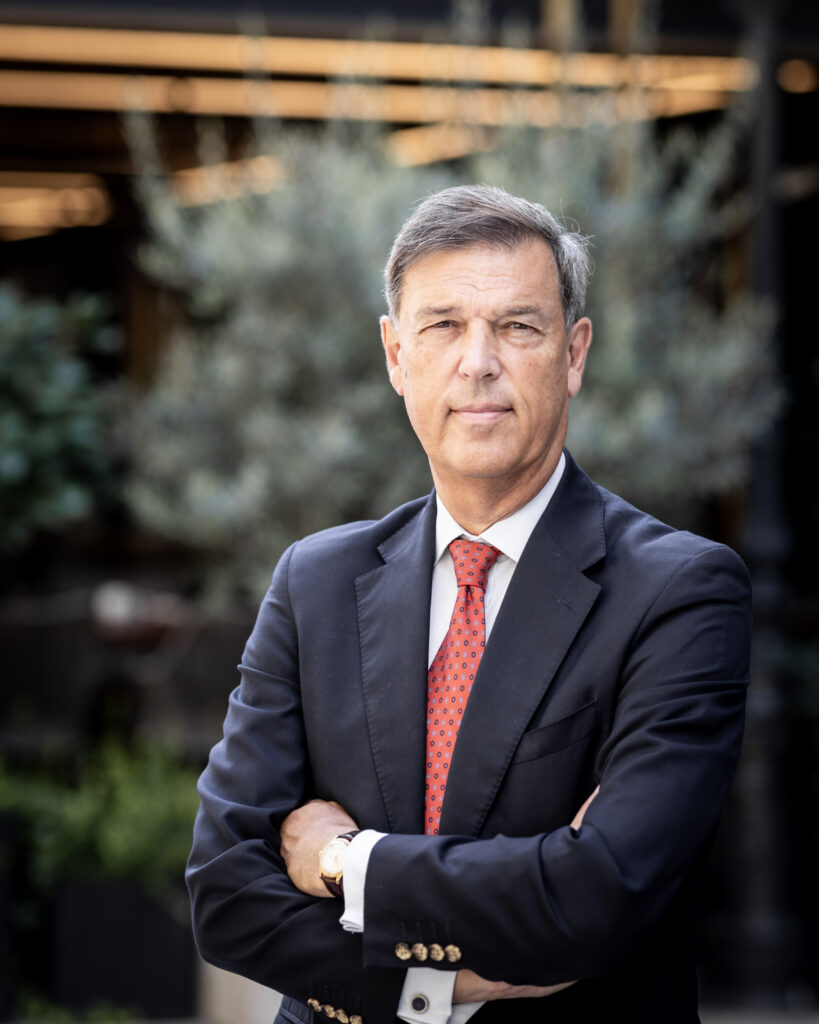
George Beebe, Director of the Grand Strategy Program,
Quincy Institute, at the NATO 75 conference, Budapest. (Photo: Hungarian Institute of International Affairs)
That latter aspect involves the balancing of conventional forces, nuclear weapons, and broader arms control, and “these aren’t the things that Russia and Ukraine can negotiate bilaterally. The United States has to be directly involved in that,” Beebe said. “Because these issues are tangled to the American military posture.”
“In order to negotiate peace talks, a couple of things must happen: Ukraine is not going to become a member of the NATO alliance; and Ukraine has the right to apply for European Union membership. Its EU membership negotiations will require painful aspects from Kyiv, such as the Common Agricultural Policy and human rights issues.” Beebe added:
“The EU accession is something that the Russians conceded in the failed peace negotiations with the Ukrainians in Istanbul just months after the invasion.”
According to him, a ceasefire between the opposing parties is possible. However, a frozen conflict is unlikely – as Russia will never agree to Kyiv becoming part of NATO. In order to counteract this, Moscow will keep the conflict ongoing, at least on a low level.
Finally, he noted that Donald Trump is a real “deal-maker”. Beebe believes that “Trump doesn’t want to take out the cards of his hands.”
“If he becomes president, he will realize, that he has the two biggest sources of leverage in dealing with Russia: the first is to increase Ukraine’s aid or at least continue it, and the second is easing sanctions on Russia in return for good behavior,” George Beebe concluded.
The Qatari Thread in the Gaza Conflict
We asked David P. Goldman, who was also one of the speakers – an economic strategist and a Research Fellow at the Claremont Institute in Washington DC – about his view on the other hot conflict zone, the Middle East.
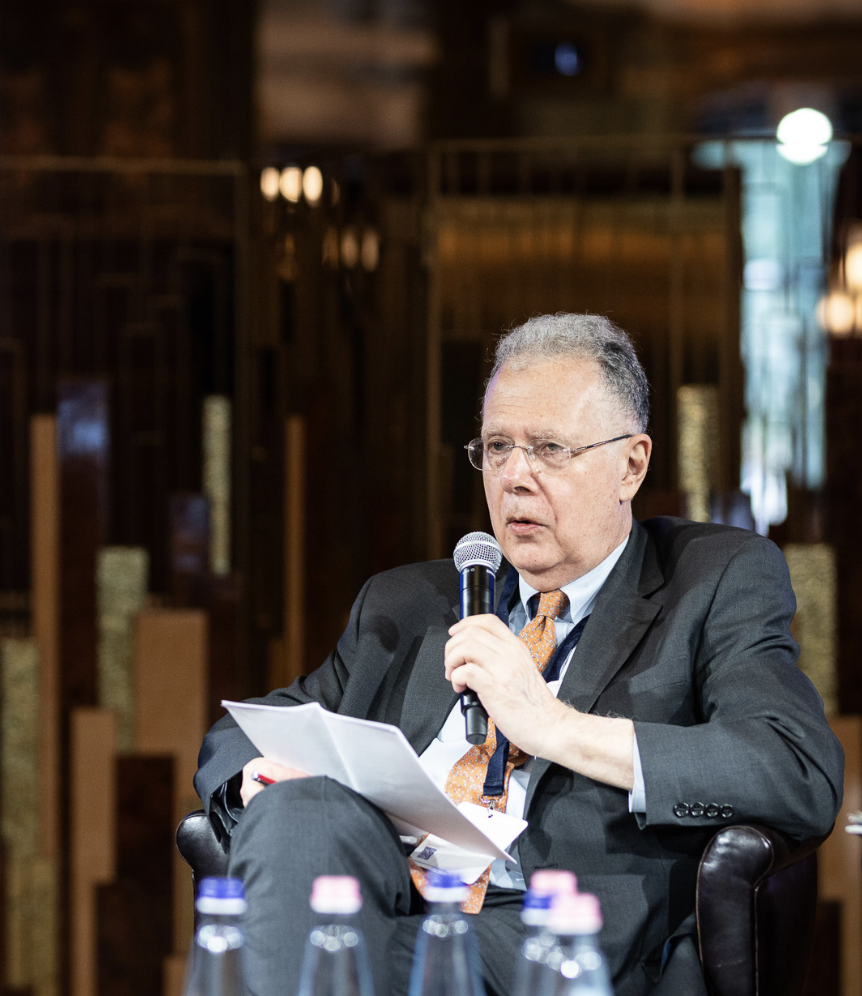
David P. Goldman, Washington Fellow at the Claremont Institute, at the NATO 75 conference, Budapest. (Photo: Hungarian Institute of International Affairs)
The Clermont Fellow initially stated that in the Gaza conflict, the central problem is the role of Qatar. Goldman argues that before October 7, the Qataris were the ones who convinced the Israelis that Hamas was not a threat. “What explains this catastrophic intelligence failure? We know that there was a lot of intel coming up from Israeli signals intelligence about a possible attack. But they were getting contrary intel, which they believed,” said the economist.
“The Israeli government and the Mossad believed them because, before the attacks, the Qatar diplomats were coming to Gaza every month with suitcases full of cash, 15 billion dollars a month to pay off the Hamas members not to attack Israel,”
told Goldman, who is also deputy editor and columnist at Asia Times.
Now, if Qatar felt betrayed by its client Hamas. Why didn’t they take any action against Hamas after October 7?
Goldman also reminded that Qatar, in January 2022, was designated as a major non-NATO ally of the United States. It means, according to Goldman, “within the American security architecture, Qatar and Israel were equals. Not to mention that Qatar hosts the largest American military base (the Al Udeid Air Base – the editor) in the Middle East.”
“The U.S. forced Israel to engage Qatar as a middleman in negotiations, despite Qatar’s previous funding of Sunni rebels. The U.S. elevated Qatar’s status to a major non-NATO ally even after Saudis and Emiratis blocked Doha in 2018-2019,” he continued.
“The U.S. consideration which believes it has a strategic use for Sunni jihadists, putting Israel in a difficult situation,” Goldman pointed out. “The U.S. should degrade the Qatar alliance and punish Qatar for its support for Hamas and its duplicity.”Another problem is that Qatar hires a very large number of former senior U.S. military officers.
“There is a joke in Washington that every time you pass the Qatar Embassy, your pockets fill up. So, the United States is part of the problem, not part of the solution,” he stated.
Goldman argued this leaves Israel in a very difficult situation. “It is known that the Israelis have been talking to the Russians and asking for help. For instance, Roman Goffman, who was born in Belarus, became Netanyahu’s principal military aide in April. In early September, he visited Moscow to discuss the return of Israeli hostages,” he stressed. However, in the background, Goldman believes this is related to Russian President Vladimir Putin’s offer to mediate between Israel and Iran. “Embarrassing for the United States, but it’s her own silly fault because the United States concentrated its diplomacy on the Gulf states and put Qatar in its place,” he said.
“Gaza is an inherently impossible situation because you have no Palestinian political entity which is capable of successfully ruling Gaza, just the corrupt Hamas.”
The researcher emphasized: “In the West, especially in the United States, we need visionary leaders who will demand technological breakthroughs from the military, as we did in the past when we won the Cold War against what then seemed impossible odds. And we need corporate leaders who can take up the challenge and use the funding effectively and venture capitalists who will commercialize the technologies.”

